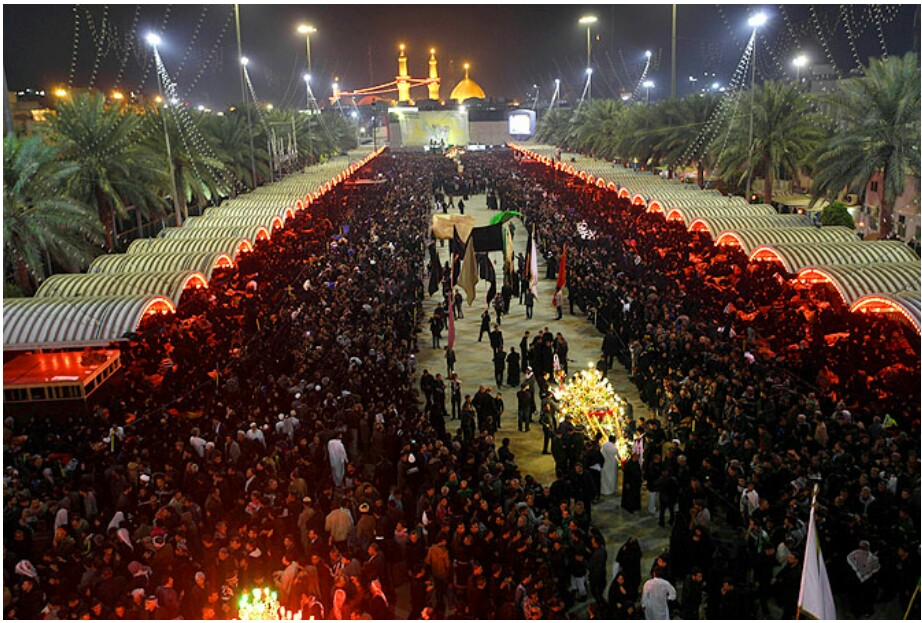The Message of Muharram
As long as human beings humiliate other human beings, as long as there is injustice in the world and oppression festers, every day isashura and every land is Karbala. That is the message of Muharram, the first month in the Islamic calendar.
Ashura is the 10th day of Muharram. This year ashura falls on 12 October when it will once again be remembered how ruthlessly Imam Husain, the grandson of Muhammad, the Prophet of Islam was murdered in the 7th century at Karbala, in modern day Iraq. Husain, 54 had led a caravan of 72 family members and companions, including women and children to join friends in Kufa who were struggling against Yazid, a tyrant ruler of the time.
On the way through the desert, the army of Yazid attacked Husain's family and friends. Before killing most of them and beheading Husain, the waters of the Euphrates River were turned off and many in the caravan died of thirst.
After the massacre, Yazid's minions had marched the surviving members of Husain's family members from Karbala to Kufa and finally to a prison in Damascus.
Zainab, the sister of Husain, was beside herself with grief to see her brother’s head laid out at the foot of Yazid's throne in Damascus. Her unkempt hair had turned grey and her back doubled up into a bow at the sight.
In silence she had mourned:
My brother, how can I bring you back again?
Whom do I tell about my pain?
My world is changed beyond belief.
It is impossible to breathe in this house of grief.
The image of the mourning Zainab has been kept alive by poets and writers whose work continues to praise her as a woman who was defeated, but not destroyed. Zainab is portrayed in literature and in sacred texts as a woman who had endured intense suffering but remained defiant as she held her head high and looked Yazid in the eye.
“Is this justice? Oh son of freed slaves! You provide your women and slave-girls with cover but hold the daughters of Muhammad prisoner and insult them by mocking their modesty, by exposing their face to the enemy in one city then in another?
Oh Yazid! Do you think that by taking us prisoner and parading us in public all over Arabia you can humiliate us in the sight of Allah, and earn respect for yourself?” goes the narrative to this day.
Children even now are told how the extravagant sparkle of Yazid’s palace paled before the words of Zainab that day, and the tyrant had stopped to tickle his pet monkey. A smirk that had wanted to make its way to Yazid's face froze, and quandary made him nervously stroke his beard sprinkled with gold and silver confetti, and diamonds ground to dust.
“A kind of hush dropped upon the wealthy merrymakers. The entire congregation of hundreds of courtiers looked to the floor and could eat and drink no more. Jesters were prompted to hold back their buffoonery and sycophants their breath, as they listened to the grand daughter of Muhammad speak.
“You are a ruler by force. You misuse your powers and oppress the people. You will have to kill me too if you touch my nephew,” Zainab said clutching to her breast 22 year old Zainul Abidin, the ailing son of Husain who had survived Karbala. Two of her sons, one nine years old and the other one year older were killed fighting the tyran's soldiers beside Husain,” I recall my grandmother telling us every year during Muharram.
When the children surrounding her chorused what happened next, my grandmother would wipe tears flowing down her face to continue, “Then the surviving members of the family of Muhammad was set free and Zainab led them to Medina, the city of the Prophet. Here people gathered around her in a majlis and she recounted for them the incident of Karbala as she had seen it and as she had experienced the tragedy. The same incident was repeated by others and has come to modern times by word of mouth as well as in writing".
As children fell asleep one by one listening to grandmothers tell similar stories around the community of believers during Muharram each night, many dreamt of Zainab waving open the curtain of the tent at Karbala before it was set on fire by the enemy, her face unveiled, breast heaving, limbs trembling, the back bent and she wailing:
Ah Karbala, is this the way of a host,
My parched throat in pain?
It will help most,
If you get me to Husain.
Under cover of desert sun,
The daughter of Ali ran,
To look for my father's son if I can.
Dead to danger she drew near,
To witness the brother's head dangled from spear.
Could you bury me too beside my brother?” she asked,
Without tear.”
Many believe that it is Zainab who saved this incident in the history of Islam from the flames of Karbala that day by talking about the injustice that she had witnessed for future generations. It is in the same spirit of solidarity with the suffering of Husain and the Imam's family members and friends that young ones in the community are taught never to ever deny water to the thirsty.





